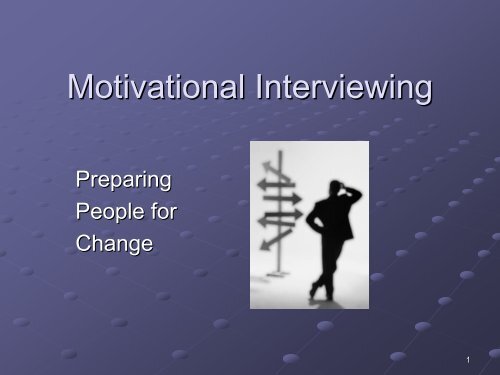Motivational Interviewing - Addiction Management
Motivational Interviewing - Addiction Management
Motivational Interviewing - Addiction Management
Create successful ePaper yourself
Turn your PDF publications into a flip-book with our unique Google optimized e-Paper software.
<strong>Motivational</strong> <strong>Interviewing</strong><br />
Preparing<br />
People for<br />
Change<br />
1
You would think…<br />
You would think after two heart attacks she<br />
would stop smoking, exercise, take meds…<br />
You would think after numerous blackouts,<br />
hangovers, and killing someone while drinking<br />
and driving, he would quit the booze…<br />
You would think after taking a chainsaw to his<br />
face he would stop using drugs…<br />
2
So…why do people change?<br />
People change naturally<br />
Formal treatment mirrors natural change<br />
Change influenced by interpersonal factors<br />
In therapy, change happens early in the process<br />
Therapist makes a difference<br />
Empathetic style facilitates change<br />
Level of motivation predicts change<br />
3
Motivation - Defined<br />
Ready: : A matter of priorities<br />
Willing: : The importance of change<br />
Able: : Confidence for change<br />
When changing a behavior is of high importance,<br />
and a person feels confident in their ability to<br />
change, and changing is prioritized as needing<br />
to happen now – a person is MOTIVATED!<br />
4
“Constructive behavior change seems to<br />
arise when the person connects it with<br />
something of intrinsic value, something<br />
important, something cherished. Intrinsic<br />
motivation for change arises in an accepting,<br />
empowering atmosphere that makes it safe<br />
for the person to explore the possibly<br />
painful present in relation to what is wanted<br />
and valued.”<br />
MI 2 nd Ed. (p. 12)<br />
5
What is the goal of MI?<br />
To get people to resolve<br />
their ambivalence (i.e.<br />
conflict) about changing<br />
their behavior, while not<br />
evoking resistance (e.g.<br />
get confrontational,<br />
blame, label).<br />
6
What is <strong>Motivational</strong> <strong>Interviewing</strong>?<br />
A directive, client-centered centered counseling style<br />
Elicits behavior change by helping clients<br />
explore and resolve ambivalence<br />
Helps resolve ambivalence by increasing<br />
discrepancy between current behavior and<br />
desired goals while minimizing resistance<br />
It is a way of being with a person more than a<br />
toolbox of techniques<br />
7
MI helps clients change by…<br />
Recognizing their high risk behaviors<br />
Evaluating how much of problem their behavior<br />
is for them relative to the rest of their life<br />
Looking at ways to begin the process of change<br />
Resolving ambivalence<br />
8
The “Righting Reflex”<br />
Built in desire to help people set things right<br />
We are drawn to the field to help others<br />
Ms. Righting Reflux meets Mr. Ambivalence<br />
Mr. A talks about the problem and Ms. R<br />
provides advice, counsel, and direction<br />
What happens next……<br />
……?<br />
9
The Spirit of MI<br />
Collaboration: : counselor tone emphasizes<br />
partnership that respects client’s s view of problem<br />
and offers nonjudgmental space to explore<br />
Evocation: : counselor facilitates the client’s s own<br />
exploration of the issues related to behavior<br />
change, including pros and cons of changing<br />
Autonomy: : responsibility for change resides with<br />
the client – who must decide if, how, and when<br />
change will occur<br />
10
Four General Principles<br />
Express empathy<br />
Develop discrepancy<br />
Roll with resistance<br />
Support self-efficacy<br />
efficacy<br />
11
Five Basic MI Skills<br />
Ask open-ended ended questions<br />
Listen reflectively<br />
Affirm<br />
Summarize<br />
Eliciting change talk<br />
12
References<br />
<strong>Motivational</strong> <strong>Interviewing</strong>: Preparing people to<br />
change addictive behavior by William R. Miller &<br />
Stephen Rollnick (1991) – The Guilford Press<br />
<strong>Motivational</strong> <strong>Interviewing</strong>: Preparing people for<br />
change (2 nd Ed.) by William R. Miller & Stephen<br />
Rollnick (2002) – The Guilford Press<br />
13




